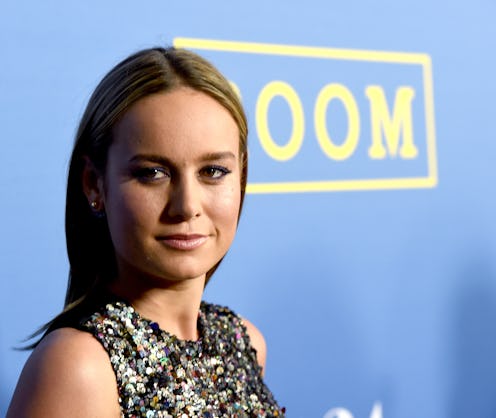Entertainment
What Exactly Is An "It Girl"?
She may despise the term, but when it comes to so-called "it girls," Brie Larson is asking all the right questions. "But what is 'it'?" Larson asked during a recent sit-down with CBS News. "There is no 'it'! And who was 'it' before 'it'? And when does 'it' go away? When did I get 'it'? Who's gonna take 'it'?"
While "it girl" has lent its name to many a title — from songs by Pharrell Williams and Jason DeRulo, to a Gossip Girl spinoff series to a 2002 documentary starring the Hilton sisters — little is concretely known of its origins before the 1927 Elinor Glyn's novela-turned-film of the same name, starring OG "it girl" and silent film star Clara Bow. To cement Bow's status as Hollywood "it," Bow's studio paid Glyn $50,000 to publicly annoint Bow an "it girl."
While Bow would later admit that she wasn't sure what "it" meant, Glyn offered up a more full-bodied definition, explaining, according to Jeanine Basinger's Silent Stars , "with 'It,' you win all men if you are a woman and all women if you are a man. 'It' can be a quality of the mind as well as a physical attraction."
It also cemented the term in the lexicon of pop culture. In decades later it would be given by press to starlets like Jean Harlow and Marilyn Monroe, implying a certain air of genre-specific sexuality, and later to creative muses in bohemian circles both musical (The Rolling Stones' Marianne Faithfull) and artistic (Andy Warhol's Edie Sedgwick — the artist, who, according to Mental Floss , "had a habit of making 'superstars' out of attractive young women and then replacing them after a little while," perhaps embodies the idea more than anyone).
Decades later, "it" may very well may have become something of an editorial cliche, the term now seems to hold about as much cache as "blogger." And while the while the term still insinuates the same molded young ingenue type, it now comes with the added implication of some factor of indie buzz — whether its Brie Larson's heralded performance in Short-Term 12 or Chloe Sevigney in Kids.
It inadvertently implies impermanence, "of the momentness" calling to mind the "fifteen minutes of fame," "famous-for-being-famous" celebrity socialite: youth-fleeting, reign temporary. It girl is an opportunity: capitalize on the media attention and join the ranks of bonafide celebrity, or fade into Page Six obscurity.
It girl, as it stands today, connotes little beyond a young woman with any modicum of "edge" and media training. Oftentimes, it's more about personal branding than anything else. It could mean a reality star with a perfume line, a famous person's model-turned-DJ daughter, or simply, an attractive woman with a DSLR and a social media following.
To some, the term applies less to one's achievements than the frequency with which one is photographed at parties. The writer William Donaldson defined the 1990's adaptation of "it girl" to mean "a young woman of noticeable 'sex appeal' who occupied herself by shoe shopping and party-going."
Take Chloë Sevigney, for instance. A seven-page piece in The New Yorker, "Chloë's Scene," deemed the then-nineteen-year-old an "It Girl with a street-smart style and a down-low attitude." 1994's "coolest girl in the world" has since expanded her sphere of influence to include film roles (which culminated in a Best Supporting Actress Oscar nom for her role in Boys Don't Cry) and a successful line for Opening Ceremony.
"In naming someone an it girl, a publication is either hedging a bet (Gretchen Mol will be all that anyone’s talking about in 1998) or trendspotting (Cara Delevingne is everywhere in New York; you’ll be seeing her everywhere else soon)," Buzzfeed's Anne Petersen wrote. [...] It’s a seemingly safe way to declare someone as worthy of your attention without actually articulating what, exactly, merits that attention. These girls are it: no matter that the antecedent to 'it' remains unknown."
Unsurprisingly, model-journalist-television host-writer-designer Alexa Chung, who many consider a Sevigney predecessor, has a lot to say on the matter. For several years, she took offense to the term, deeming it sexist and limiting. She admitted to The Observer, “I used to have a voice because I was interviewing people and writing, but as soon as I got swept up in the fashion world, I was just a pretty girl at a party wearing a pretty dress. [In those circumstances] you’re not worth anything other than the outfit on your back.” In recent years, Chung seems to have reconsidered, even penning the book "It," and admitted that "with Tumblr and Instagram stars it’s applied to a larger variety of women who are doing quite interesting things and I figure yeah, it’s actually very flattering.”
So what, exactly is "it"? I still can't quite put my finger on it, but, to quote Supreme Court justice Potter Stewart's ruling on what constitutes obscenity, “I know it when I see it.”
